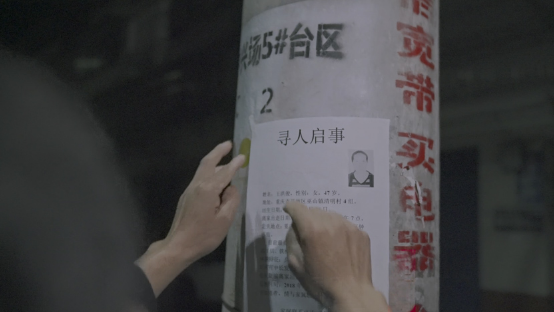Also known as “Church of Almighty God,” the forbidden religious group keeps attracting members, despite prosecution.
By Du Xinyu
Dec 22, 2020
To Long Daibing, his wife might as well be dead.
After she walked away from the family last year, Long, 47, at first did his utmost to find her, handing out flyers in nearby villages and reporting her missing to the police.
Their 21-year marriage had been good, and their family life with three children peaceful, Long says. But in 2017, his erstwhile illiterate wife began drawing and writing notes with misspelled characters about “God,” using an “S” instead of the Chinese shen. When police came to Long’s home in rural Chongqing, in southwestern China, they took these notes away, as well as a Bible-like book, and a cryptic farewell letter she had written addressed to her children.
On his phone, Long still has a picture of that letter. “Please tell your grandmother and your dad that, because the circumstances are evil, I’m leaving for now to hide from the circumstances. When the circumstances get better I’ll return,” Long says, reading the letter out loud. “Don’t look for me, it will be a waste of money. Don’t call the police. If anyone asks, tell them I don’t believe in God anymore, and that I’m away making money.”

Long Daibing and his youngest son have dinner at their house in rural Chongqing, September 2020. Long gave up his job in Shanghai so he could care for his family. Liu Jingwen for Sixth Tone
Long’s wife had gone to live with Quannengshen, or the Church of Almighty God, one of 14 religious groups that the Chinese government has banned and designated as cults. More widely known as Eastern Lightning, it was founded by a physics teacher and part-time preacher named Zhao Weishan in the early 1990s in northeastern China. The group claims that Jesus reincarnated as a Chinese woman reportedly known as Yang Xiangbin, Zhao’s alleged mistress. In the years after, Eastern Lightning spread from rural areas to cities, gathering thousands of followers across China. In 1995, Chinese authorities banned the group. Six years later, Zhao and Yang received asylum in the United States, where the group is now headquartered.
In May 2014, the organization gained widespread attention both in China and abroad when six of its members killed a woman in a McDonald’s in eastern China after she refused to give them her phone number. In an attack caught on security camera, they beat her to death with chairs and a metal mop handle. Two of the perpetrators were sentenced to death. As media reported on the group’s history of violence, extortion, and infiltrating Christian communities and kidnapping their members, the government announced it had already, two years earlier, begun rounding up members after the group began espousing anti-Communist Party viewpoints. About 1,500 Eastern Lightning followers had been locked up since 2012, authorities said at the time.
But that crackdown and the ongoing prosecution of Eastern Lightning has not led to the group’s demise. There are no authoritative public estimates of its size, but the Immigration and Refugee Board of Canada calculates up to 2 million members. In any case, as the experiences of Long and others show, Eastern Lightning still manages to attract new members.

Long Daibing points to a missing person poster he put up around his village in Chongqing, September 2020. Liu Jingwen for Sixth Tone
Like Long’s wife, adherents of Eastern Lightning often end up leaving their families. In 2017, the Office for Prevention and Handling of Cult Issues — which falls under the country’s Cabinet, the State Council — set up a site called China Anti-Cult Network, which, among other aims, wants to help people find relatives who have joined groups designated as cults. It lists hundreds of missing persons ads, including Long’s. But they rarely produce any leads.
Every time people from our group reunite with their relatives and thank me, I’m very moved and I remember it clearly.
— Chen Xin, head of Anti Eastern Lightning Alliance
Many relatives of Eastern Lightning members have also turned to a nongovernmental organization called Anti Eastern Lightning Alliance. The organization is run by a 38-year-old man who uses the internet alias Mieshen, meaning “exterminate the god,” and the pseudonym Chen Xin when speaking to media. His ex-wife joined the group in 2011, never to be seen again.
According to experts, Eastern Lightning commonly targets women from rural areas whose husbands are migrant workers and spend most of the year far away from home. There are more than 30 million such “left-behind wives” in China, living without their partner and taking care of children and the elderly while marooned in villages.
Chen, too, had left his wife at home in a village in eastern Anhui province, while he worked as a computer monitor salesperson in the city. In his absence, his wife began believing in a religion he later found out online was categorized as a cult. After endless fights, he started filing reports with the authorities, but to no avail.
He desperately wanted to change her mind, but nothing seemed to work. “Time wasn’t exactly my friend,” Chen tells Sixth Tone. “During my daily online search for a viable solution, I stumbled upon a QQ chat group called ‘Oppose Eastern Lightning and Save Your Loved Ones.’ I thought I had finally found something to hold on to.”
That was when Chen realized he was not alone. Feeling hatred toward Eastern Lightning, he quickly became the most active member of the group chat. In 2012, after his wife divorced and left him, Chen set up a website and dozens of groups on chat app WeChat dedicated to searching for people across China believed to have joined Eastern Lightning. A few local police officers have also joined his groups, sometimes helping with searches. Over the years, Chen has helped return 170 people to their families, sometimes pleading with Eastern Lightning preachers to release people he knows.
“It’s still an extremely difficult process,” Chen says. “I couldn’t even convince my own wife to come back and, in the end, divorced her. But every time people from our group reunite with their relatives and thank me, I’m very moved and I remember it clearly.”
According to Wang Yu, a religion researcher at the Communist Party school of the Ningxia Hui Autonomous Region and one of China’s foremost experts on Eastern Lightning, leaving the group is not as easy as joining it. The group’s preachers approach people, pretending to be regular Christrian clergy. They then draw them in with small talk about their everyday problems, a theme also present in their preaching. “Sermons usually start with complaints about household duties, about being left behind in a village having to take care of children,” Wang says. “Then slowly they will shift to blaming society for their misery and loneliness.” When members of the church, usually relatively recent recruits, decide to quit, a higher-level church official will explain to them the serious retribution that will follow after renouncing their faith.
They (women from rural areas) will see religion as a way to pour their hearts out.
— Wang Yu, religion researcher
China Newsweek, a current affairs magazine, in 2014 interviewed a then-39-year-old woman who had left Eastern Lightning after being a member for 12 years. She described how she was pressured to donate her savings and house fellow followers as part of the “total devotion” she was expected to display. In 2011, the group started to focus on preaching about the end times, which it said were imminent. The main materials it used to prove the end was nigh were images and videos from the deadly 2008 Wenchuan earthquake. Followers were forced to watch them over and over. She remembered seeing half of a human corpse being dragged out of the debris, a sight that haunted her. “I had nightmares every night of me vomiting blood and dying,” the woman told China Newsweek, adding that since then she would consider everything bad that happened to her and her family retribution for not being a better follower and for not adequately fulfilling her total devotion duties.
“Women living in villages, especially those who are a bit older, have more trouble adapting to new things. So they will see religion as a way to pour their hearts out,” Wang says. “Many of them don’t really want to get to the bottom of what they believe in. To them, religion provides emotional catharsis.”
Wang Xiaoping, who is not related to Wang Yu, thinks it was his wife’s naivete, the very quality that originally attracted him to her, that made her join Eastern Lightning and leave him and their 7-year-old son. He’s not sure when she started to come into contact with the group, but about a year ago she left their village near Chongqing.

The wallpaper inside Wang Xiaoping and his missing wife’s room, Chongqing, September 2020. Liu Jingwen for Sixth Tone
Wang, 29, met his wife through an online chat room when she was underage. Soon after they became lovers, and, when his wife was just 16, parents. The couple then left their hometown for factory jobs in the eastern city of Hangzhou. Two years later, Wang’s wife returned to their village to look after their son, who had been left in the care of grandparents while Wang stayed to earn money, a common arrangement among rural couples that Wang says they, at the time, were fine with.
But, Wang says, his mother-in-law had always been religious and had passed a “Bible-like” book to Wang when the couple first moved in together. In his vague memory, it had “god, lambs, and some lyrics written in it.”
“Looking back, I should have known,” says Wang, adding that he had heard of followers of Eastern Lightning in neighboring districts. “I was in such shock when my wife told me she wished to go to an (Eastern Lightning) assembly for a few days and that she had started to believe in this god.”
I think she told me to wait for her. I don’t remember.
— Wang Xiaoping, husband of Eastern Lightning follower
The astonishment quickly turned to vexation. Wang rushed back home, trying to talk his wife out of following Eastern Lightning, which he insisted was dangerous. The intervention didn’t go well, and Wang called the police, who showed up shortly with just words of warning. His wife stormed out with her suitcase and left for her parents’ house, which she would do after any of the couple’s squabbles. Despite the occasional fights, Wang says while swiping through family photos and selfies of the two, “our relationship had always been very good.” In one picture, his wife has straight bangs and a big smile.
Wang decided to return to work the next day and leave his wife to come to her senses. On a train back to Hangzhou, she called. “She asked me to take care of myself, work hard, and not overthink anything,” Wang says. “I think she told me to wait for her. I don’t remember.” His voice fades to a whisper. To this day, it was the last time they ever talked.
Wang doesn’t know who to blame for his wife’s eventual departure — his mother-in-law, who Wang believed preached to his wife; the police’s dereliction; or himself for reporting his own wife. Worst of all, Wang doesn’t know if she will come back someday. He doesn’t know where or how to move forward with his life. For now, he left his son with his parents and went back to his job in Hangzhou to make ends meet.

Wang Xiaoping and his son stand outside their mountainside house, in Chongqing, September 2020. He Kai for Sixth Tone
“His mother was with him for his birthday last year,” Wang says. This year, in September, he asked for a few days off work so at least one parent would be there. “He asked me to find another mom for him,” he says. Wang mostly worries about his son’s grades but feels lucky his parents are still healthy and able to help him care for the child.
Without his wife, Long decided to quit his job in Shanghai so he could care for his youngest kid, who is still in elementary school, and for his aging parents. He has given up searching for his wife. Long still has piles of missing persons posters, collecting dust, stashed in the corner of his room. “I can’t really concentrate on anything right now. I can’t fall asleep at night,” Long says. “It’s a 20-odd-year relationship, after all.”
Chen still devotes a lot of time to combating the Church of Almighty God with his organization, even though he has given up on getting his ex-wife back. “I’ve moved forward with my life,” he says. But at the same time, he doesn’t seem to have made peace with her departure.
“I did everything I could think of back then,” Chen says. “I know more now, and if it happened today I definitely could have found a solution. But I guess it’s too late.”
Source: https://www.sixthtone.com/news/1006609





